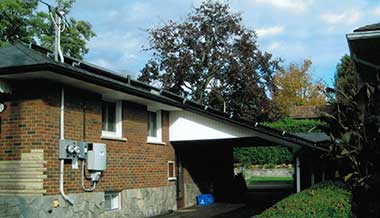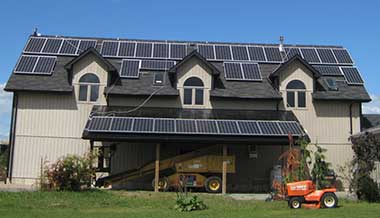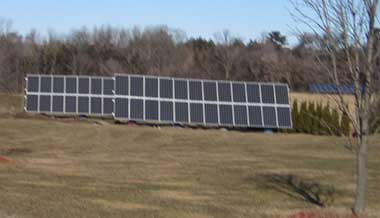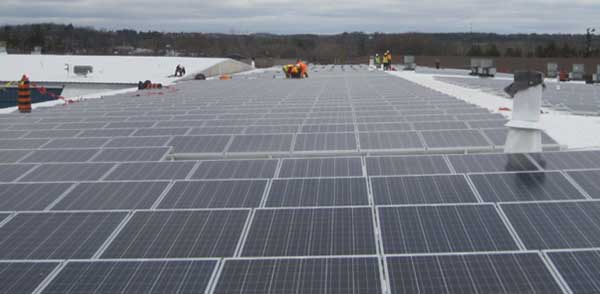New 30% Federal Investment Tax Credit
The Federal Government of Canada has just introduced (Jan 2023) a 30% Investment Tax Credit (ITC) for renewables. This includes a variety of technologies (solar, battery based systems and passive thermal energy storage,etc.) which are eligible for this preferential tax treatment. In Alberta, you can combine the ITC with the very generous carbon credits as explained below.
The new ITC, in practice will only benefit large hydro users in Alberta & Ontario –and especially AB. These provinces have the highest rates of hydro in Canada and among the highest in continental North America. Manitoba and Quebec have the lowest rates of hydro in Canada and among the lowest in continental North America. (Water hydro). In fact, even if solar/battery equipment prices fell 40 % from today, the ROI would still be too low to warrant any investment. Given the structure of hydro prices in the other Provinces, solar/battery-based system could be a solution, however, they do not offer the same credits as AB, are too small (population), or have poor solar irradiation map(s). They would be however, ideal for the suite of Phase Change Materials. Every Province (and all US states) includes demand pricing in the hourly price based on volume-except for Ontario. Ontario charges all users the commodity cost and then Global Adjustment (GA) costs based on volume for Class “B” and a capacity allocation model for Class “A” . Thus, you will note that there are different solutions to lower hydro costs in Ontario based on your end user classification.

I started out by putting a Solar System on my Home.

I then did many rooftop installations (MicroFIT)

I also did a few ground mounts.
Then I installed a few smaller Industrial sites under the FIT program …

and then some larger sites under the large FIT program.

Carbon Credits in Alberta
In addition to the 30% Federal ITC, in Alberta you can monetize the carbon credits that a solar system produces. I have enclosed a schedule of the carbon credits for a hypothetical one (1) MW (DC Nameplate) solar system in Alberta which are worth $500,000 over the ten (10) year contract period. (There are no carbon credits available in Ontario).
The Government of Alberta has put a pause on all solar projects over one (1) MW. This strategic review will take approximately six (6) to seven (7) months. The Province was concerned with the large number of pending applications (200+ MW’s) where developers wanted to turn large tracts of farmland into solar/wind farms. These developers would provide power to the grid at the Alberta pool price (which is rapidly increasing). This combined with the new (Jan 2023) (ITC) and the already very generous carbon credits has caused this review. The goal of the review is to come up with a plan that matches the current/future transmission capacities etc. with projected future hydro demand.
The Province has indicated that they want more smaller rooftop solar projects on existing structures instead of farmland. They are want more smaller players (and building owners’) to be able to access some of the current/future transmission capacity in order to distribute the very generous combined economic incentives/benefits of the program more equally. I believe that the Province will lower the cap for large projects and will allow for larger rooftop solar systems on existing structures when the review is completed.
Here is an example of the Carbon Credits for a hypothetical one (1) MW Solar System in a pdf Labelled Carbon-Credits-in-Alberta
As you can see the average value of the carbon credits are approx. $500,000 over the ten (10) year term. This is based on the current load displacement factor (LDC) of .55tCO2e/MWh (for 2023) and .52tCO2e/MWh for 2024. You will receive the offset credit rate factor for the entire term based on the year of completion.
Implications of Federal Carbon Tax
Everyone in Alberta is well aware of the fact that hydro prices have risen dramatically (+40%) in the past few years. Moreover, hydro prices will continue to substantially rise due to the “spark spread” + carbon taxes and the current/projected energy mix for Alberta. The current energy mix for Alberta is 89% fossil fuels and 11% for renewables which includes 3% for hydroelectric. In Ontario, the energy mix is 54% nuclear, 24 hydroelectric, renewables are roughly 9% and Gas 8%. (The Gas plants are put online to meet short-term supply/demand issues and operating reserve requirements).
In Alberta, the current Federal Carbon tax is $2.6219 per GJ and the commodity cost depending on your provider is approx. $2.78 to $3.015 per GJ. At $170 per tonne the Federal Carbon tax charge would be $8.91446 per GJ. The same is true for Ontario. Enbridge gas rates change quarterly (on April 1st, , 2023) which also coincides with the annual increase in carbon taxes. (The rate will be $65 per tonne for 2023). The Federal carbon tax increased from 9.79 cents per cubic meter to 12.39 c/m3. The actual commodity cost fell from 21.2899 to 13.25 cents per cubic meter or a decrease of 37%. It is an inescapable fact that the carbon taxes will soon cost more then the actual commodity. (At $170 per tonne the carbon tax will be 32.40 cents per cubic meter in Ontario). This is an inescapable fact if current /future Governments follow through with this policy.
The implication of this is simple. Given the energy mix and proposed future increases in the carbon tax, hydro rates in Alberta will increase much more than those of Ontario. Alberta is phasing out coal and replacing that capacity with gas plants at the same time carbon taxes are significantly increasing. The only hope is that the Federal Government exempts the carbon tax for natural gas used in the production of hydro-otherwise hydro prices will continue to spike. Ontario while having high hydro prices as explained above has a broader energy mix and only uses gas plants to manage supply/demand spikes and operating reserve requirements/considerations. It is the simple law of chemistry, thermodynamics and economics. Natural gas has a certain energy content, gas plants/generators have a certain electrical and thermal efficiency etc. (I have explained this in more detail in the heading “ Generators and CH & Power” heading).
Thus, the current/proposed Federal Carbon Taxes will lead to much higher hydro prices in the future in Alberta. The current fluctuations in spot prices and forward markets are subject to local supply and demand factors. However, as coal is being phased out and more gas plants are constructed you are going to have these price fluctuations until you got a constant supply of hydro to the market. However, the idea that you’re going to have enough renewables to come online to provide base load power is simply not going to happen. Any responsible person in the industry will tell you this. Germany for example, has spent over 800B ($CDN) on renewables since 2000 and due to the war in Ukraine had to re-open previously closed coal plants. You have to understand, the various green policies and initiatives around the world have been an abject failure in lowering hydro prices. If you go on Google, check what the residential hydro prices are in Germany and Australia. You will find .48 cents per kWh for Germany and 27 cents per kWh for Australia. (I will let you discover the Industrial/commercial price for hydro yourself).
Note: I will now point out the recent developments around the Federal Carbon Tax. The Federal government has removed the carbon tax from home heating oil. This carve out was done in direct response to members of the current Government MP’s in Atlantic Canada whose constituents would be hit hard with much higher home heating costs. All the rest of the other Provinces have requested that Ottawa do the same and remove the carbon tax from all forms of energy involving home heating which, has been rejected by the Federal Government. Recently, the Government of Alberta took the Federal Government to the Supreme Court and won. With respect to Bill C-69 (Impact Assessment Act), the Supreme Court ruled that the Federal Government’s overly broad legislation violated Provincial jurisdiction rights (energy) in Alberta and the other provinces. Since then, the Province of Alberta has introduced the Alberta Sovereignty Act where the Province would refuse provincial enforcement of specific federal laws or policies that in their opinion would infringe upon traditional Provincial jurisdictions such as energy. This is in response to the Federal Government’s Clean Electricity Regulations which has mandated a net zero grid by 2035. Again, it appears that both parties are headed for the Supreme Court. The simple fact is that there is no way Alberta can meet this mandate. There is simply not enough time or money to achieve this. If the Supreme Court rules in favour of the Federal Government and no changes are made to the current policy, then 50 cents per kWh would not be an overstatement or an exaggeration of the effects of the policy. It’s basic economics that can be proved in a few minutes.
It is clear to me that if the Federal government were to agree to at least remove the carbon tax from assets which are producing electricity that the issue may be resolved
Update: The Province of Saskatchewan will refuse to collect the carbon tax on Natural gas used in home heating as of Jan 1st, 2024.
Contact me on LinkedIn |